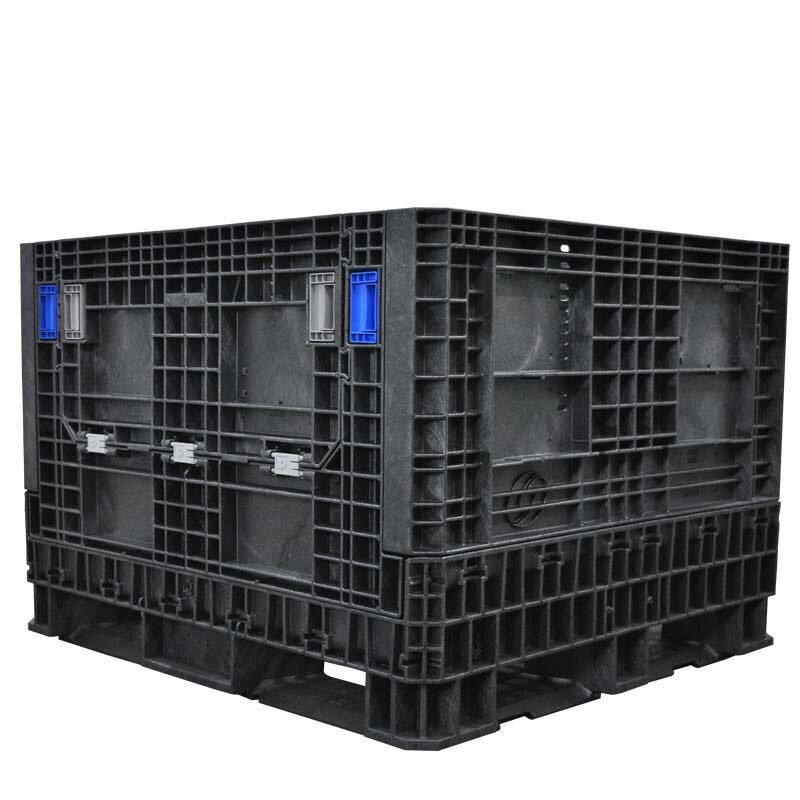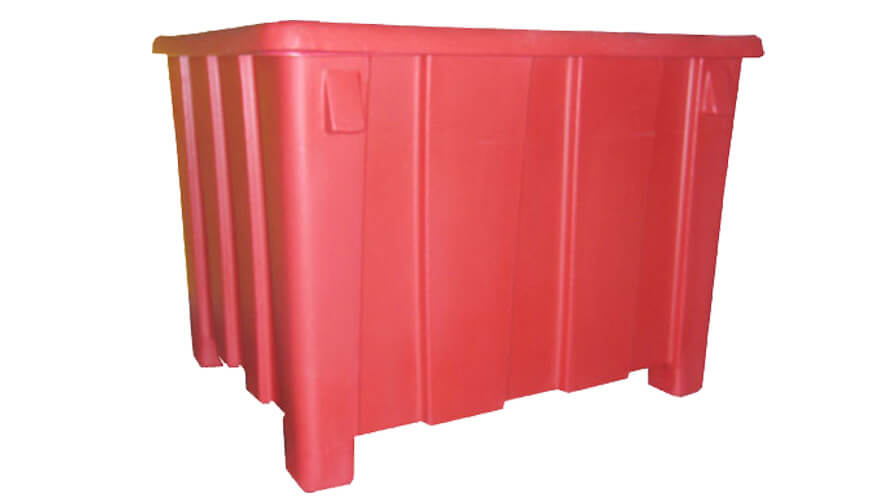The Function of Mass Plastic Containers in Effective Recycling Practices and Sustainability
Bulk plastic containers are important to modern reusing efforts. Their layout boosts the performance of product collection and transportation, adding to sustainability goals. These containers not only maximize area but additionally aid in monitoring contamination degrees. Nevertheless, their implementation is not without obstacles. Comprehending the full extent of their influence discloses a complex relationship between logistics and environmental responsibility that necessitates additional expedition.
Comprehending Mass Plastic Containers
Mass plastic containers serve as an essential component in different industries, facilitating the storage and transportation of items. These containers are commonly made from durable products such as high-density polyethylene (HDPE) or polypropylene, which provide resilience and resistance to environmental elements. Their design commonly consists of functions like stackability and modularity, permitting efficient use area throughout both storage and transportation.
Industries such as farming, food processing, and manufacturing often utilize bulk plastic containers because of their light-weight nature and simplicity of handling. The containers can be found in various sizes and configurations, providing to the specific demands of various products. Their adaptability expands beyond simple functionality; they can additionally be tailored with covers, handles, and labeling options to boost functionality - bulk plastic containers for sale. Consequently, bulk plastic containers play a critical duty in enhancing logistics and supply chain procedures throughout several markets, consequently adding to total performance and cost-effectiveness
Advantages of Making Use Of Mass Plastic Containers in Recycling
The use of mass plastic containers greatly boosts the performance of the procedure when organizations prioritize recycling initiatives. These containers are created to maximize room, permitting for the storage space and transportation of bigger quantities of recyclable materials. This leads to less trips to recycling centers, thereby minimizing gas intake and associated emissions.
In addition, mass plastic containers are immune and resilient to various ecological elements, guaranteeing that products stay secured during handling and transit. Their light-weight design additionally adds to decrease transportation prices.
Moreover, the harmony of these containers assists in much better sorting and processing of recyclable materials, which can enhance general recycling rates - plastic bulk containers. Organizations that take on bulk plastic containers likewise show a commitment to sustainability, positively influencing their brand image. Ultimately, these advantages not just simplify reusing methods however additionally add to more comprehensive ecological objectives
How Mass Plastic Containers Facilitate Product Collection
Efficient product collection is considerably boosted by the use of bulk plastic containers, as they supply a structured and reliable remedy for collecting recyclable products. These containers are created to accommodate big quantities of materials, which simplifies the sorting and storage procedure. Their stackable layout makes the most of space use, making it easier for facilities to organize recyclables without mess.
In addition, mass plastic containers are weather-resistant and resilient, permitting for outdoor placement without degradation. This resilience ensures that materials remain secured up until they are collected for processing.

The uniformity in shapes and size of these containers assists in standardization across collection factors, allowing much better tracking of recyclable volumes. Their clear nature permits for very easy visibility of materials, aiding in the tracking of contamination degrees and assuring that just ideal products are collected. Generally, mass plastic containers play a critical duty in simplifying the product collection procedure, thus advertising reliable reusing techniques.
Transportation Efficiency and Environmental Influence
Transport effectiveness plays a vital role in the reusing procedure, specifically through the optimization of tons ability wholesale plastic containers. By optimizing the volume of product carried, firms can considerably minimize the number of journeys required, thereby lessening their carbon impact. This strategy not just enhances operational efficiency however likewise adds to much more sustainable environmental methods.

Enhancing Tons Ability
Enhancing load capacity is usually overlooked, it plays an important duty in improving transport performance and minimizing ecological effect in recycling techniques. By optimizing the quantity that mass plastic containers can hold, reusing procedures can reduce the variety of journeys required for transport. This not only reduces fuel consumption but also decreases the wear and tear on cars. Reliable tons monitoring enables facilities to utilize space efficiently, ensuring that each transport cycle is as effective as possible. Furthermore, well-optimized lots can result in far better negotiations with logistics companies, potentially lowering general costs. Ultimately, improving load ability adds to a more sustainable recycling system by fostering efficient source usage and minimizing waste generated during transportation.
Minimizing Carbon Footprint
As recycling procedures undertaking to minimize their ecological impact, reducing the carbon footprint connected with transportation becomes an important objective. Mass plastic containers play a crucial function in attaining this goal by boosting lots efficiency and optimizing logistics. Their lightweight yet durable design enables maximum cargo space utilization, decreasing the variety of journeys called for to carry materials. By consolidating shipments, reusing facilities can reduce fuel intake and greenhouse gas emissions. Furthermore, purposefully locating recycling facilities minimizes transport distances, in addition lowering carbon outcomes. Using fuel-efficient vehicles and different power resources improves overall sustainability. By integrating these practices, the reusing sector can appreciably reduce its carbon impact, adding to a much more lasting future.
Obstacles in the Usage of Bulk Plastic Containers

Contamination Problems
Contamination concerns stand for a considerable challenge in the efficient use bulk plastic containers within reusing practices. These containers often collect deposits from previous materials, resulting in mixed materials that can impede the recycling process. Pollutants such as food waste, chemicals, or non-recyclable materials can endanger the honesty of the entire batch, resulting in boosted disposal costs and reduced recycling prices. Additionally, inappropriate cleaning or sorting can exacerbate these issues, making it challenging for recycling centers to process materials effectively. The visibility of impurities not only affects the high quality of recycled products however additionally threatens the total sustainability efforts aimed at lowering plastic waste. Resolving these contamination difficulties is important for enhancing the efficiency of bulk plastic container recycling.
Recycling Framework Limitations
Inadequacy in recycling facilities poses substantial difficulties for the efficient monitoring of mass plastic containers. Several reusing centers do not have the ability to refine big volumes of these containers successfully, resulting in boosted hold-ups and costs. Poor arranging innovations typically lead to contamination, as mass containers might be blended with other products, making complex the recycling procedure. Minimal transport options additionally prevent the motion of bulk plastic containers to proper reusing facilities, causing boosted land fill waste. Additionally, a lack of standardized protocols for mass container recycling develops confusion amongst customers and companies, further making complex efforts to promote sustainability. Attending to these facilities restrictions is necessary to improve recycling methods and maximize the capacity of bulk plastic containers in a round economic situation.
Ideal Practices for Implementing Bulk Plastic Containers
When organizations take into consideration executing bulk plastic containers in their reusing practices, they need to focus on a critical technique this link that enhances efficiency and decreases contamination dangers. First, choosing the appropriate container dimension and type is vital to accommodate the quantity of materials being refined. Organizations ought to likewise develop clear labeling and signs to guide individuals on additional reading correct disposal methods, decreasing confusion and mistakes. Routine training sessions for team can additionally enhance these methods, ensuring every person recognizes their roles in preserving reusing honesty.
Additionally, companies must carry out a routine maintenance schedule to evaluate and clean containers, avoiding the buildup of contaminants. Partnering with regional recycling centers can also improve the collection procedure, making certain that materials are successfully refined. Organizations should check and review their reusing metrics, using this data to improve techniques over time and promote continuous improvement in their sustainability initiatives.
The Future of Mass Plastic Containers in Sustainable Practices
As organizations significantly prioritize sustainability, the role of mass plastic containers in recycling techniques is readied to advance substantially. Advancements in products science are bring about the growth of recyclable and eco-friendly choices, boosting the environmental advantages of bulk plastic containers. Furthermore, the implementation of closed-loop systems will certainly allow for easier collection and repurposing of these containers, decreasing waste and resource consumption.
Technological developments, such as smart tracking systems, will certainly make it possible for business to keep track of the lifecycle of mass containers, improving performance in reusing procedures. As consumer demand for lasting practices grows, businesses will likely embrace mass plastic containers developed for reuse and lasting value. In addition, collaboration in between markets and governments will certainly cultivate the facility of standard recycling methods, making certain that bulk containers are effectively integrated into broader sustainability efforts. In general, the future of bulk plastic containers shows up appealing, with significant possibility for contributing to a circular economic situation.
Frequently Asked Concerns
How Are Mass Plastic Containers Made and What Materials Are Utilized?
Bulk plastic containers are generally made from high-density polyethylene (HDPE) or polypropylene (PP) These products are refined through shot molding or strike molding methods, leading to long lasting, light-weight containers appropriate for different storage and transport demands.
Can Mass Plastic Containers Be Reused Numerous Times Prior To Recycling?
Yes, bulk plastic containers can be recycled numerous times prior to reusing. Their sturdiness and layout allow for repeated usage in different applications, promoting sustainability and source performance while lowering the demand for brand-new containers.

What Accreditations Exist for Mass Plastic Containers in Recycling?
Various certifications for bulk plastic containers consist of the Recycling Collaboration's qualification, the Cradle to Cradle Qualified ™ requirement, and the Sustainable Product packaging Coalition's standards, guaranteeing containers meet certain environmental and recyclability standards for effective recycling.
Just How Do Bulk Plastic Containers Contrast to Various Other Recycling Storage Space Options?
Bulk plastic containers offer higher toughness and capability contrasted to various other recycling storage space choices, reducing the threat of contamination and promoting effective transportation. Their design sustains better company, enhancing general performance in recycling operations.
What Is the Lifespan of a Bulk Plastic Container in Recycling Processes?
The life-span of a mass plastic container in recycling processes generally varies from 5 to ten years, relying on use, worldly high quality, and ecological conditions, permitting for multiple cycles of usage prior to ultimate disposal or recycling.
When organizations focus on reusing initiatives, the usage of mass plastic containers substantially boosts the performance of the procedure. Transport effectiveness plays a necessary duty in the reusing process, specifically with the optimization of load ability in bulk plastic containers. The usage of mass plastic containers in reusing methods faces substantial challenges, specifically concerning contamination concerns and restrictions original site within reusing infrastructure. Contamination problems stand for a considerable obstacle in the efficient usage of bulk plastic containers within reusing techniques. When companies think about applying mass plastic containers in their recycling practices, they ought to prioritize a calculated technique that enhances efficiency and reduces contamination threats.